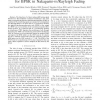Free Online Productivity Tools
i2Speak
i2Symbol
i2OCR
iTex2Img
iWeb2Print
iWeb2Shot
i2Type
iPdf2Split
iPdf2Merge
i2Bopomofo
i2Arabic
i2Style
i2Image
i2PDF
iLatex2Rtf
Sci2ools
65
Voted
ICC
2007
IEEE
2007
IEEE
Cochannel Interference Whitening Receiver Designs for BPSK in Nakagami-m/Rayleigh Fading
—The detection of a binary phase-shift keying signal distorted by like-modulated cochannel interference and noise using a noise-plus-interference whitening matched filter (WMF) is considered. The interfering signals are assumed to be independent and Rayleigh-faded. It is shown that in a synchronous channel, the signal-to-interference-plus-noise ratio (SINR) at the output of a WMF can not exceed that of the conventional matched filter (CMF) receiver. It is observed that in a synchronous channel, an interference WMF degrades the performance both through decreasing the SINR and introducing intersymbol interference (ISI). In contrast, in an asynchronous channel an optimal WMF can improve the SINR relative to the CMF receiver. It is shown that for a standard raised-cosine pulse the maximum achievable
Communications | ICC 2007 | Interference Wmf | Like-modulated Cochannel Interference | Synchronous Channel |
| Added | 02 Jun 2010 |
| Updated | 02 Jun 2010 |
| Type | Conference |
| Year | 2007 |
| Where | ICC |
| Authors | Amir Masoud Rabiei, Norman C. Beaulieu, K. Sivanesan |
Comments (0)

